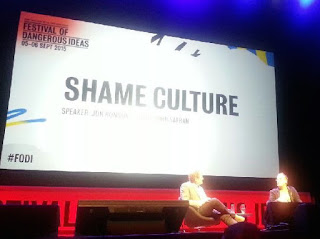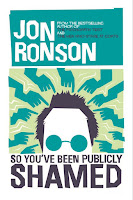Here is a summary of what happened on day one of FODI (Saturday 5 September 2015) for me:
Capitalism and the Climate - Naomi Klein
 Canadian author Naomi Klein spoke about her latest book This Changes Everything (2014) about climate change. Klein started by talking about Australia's indigenous people and made a compelling case for greater respect and understanding of indigenous people around the world. She then talked about refugees and the humanitarian crisis arising our of the Syrian civil war. She was pointed in her comments about our government's stance on asylum seekers and critical of offshore processing.
Canadian author Naomi Klein spoke about her latest book This Changes Everything (2014) about climate change. Klein started by talking about Australia's indigenous people and made a compelling case for greater respect and understanding of indigenous people around the world. She then talked about refugees and the humanitarian crisis arising our of the Syrian civil war. She was pointed in her comments about our government's stance on asylum seekers and critical of offshore processing. Klein went into detail about Nauru and the plight of its citizens, being wedged out of their tiny island by mining excavation on the inside and rising sea levels on the outside. She made the point that the guards of war refugees today could become climate refugees tomorrow.
Klein went into detail about Nauru and the plight of its citizens, being wedged out of their tiny island by mining excavation on the inside and rising sea levels on the outside. She made the point that the guards of war refugees today could become climate refugees tomorrow.Articulate, intelligent and compelling, Klein delivered a wonderfully crafted speech. She spoke of empathy and human dignity, and made a plea for all of us to be kinder to the people around us. Klein's presentation has been filmed and uploaded on to YouTube, which is well worth watching. She also has a documentary film of This Changes Everything coming out soon.
 I knew of Naomi Klein as she was a year or so ahead of me at University of Toronto. In 2000 I picked up a copy of her bestselling No Logo (2000) and was really impressed by her analysis of branding and globalisation. So I was delighted to talk briefly to her after her presentation and have her sign both No Logo and This Changes Everything for me while we spoke of Toronto.
I knew of Naomi Klein as she was a year or so ahead of me at University of Toronto. In 2000 I picked up a copy of her bestselling No Logo (2000) and was really impressed by her analysis of branding and globalisation. So I was delighted to talk briefly to her after her presentation and have her sign both No Logo and This Changes Everything for me while we spoke of Toronto.Journalistic Freedom - Peter Greste
A week ago the Egyptian court finally handed down its verdict in the retrial of the Al Jazeera staff Peter Greste, Mohamed Famy and Baher Mohamed, sentencing them to three years. Today I had the pleasure of hearing Greste speak about his ordeal and about the threats journalists face around the globe.
Greste spoke with Mark Colvin about how he ended up in Egypt, his arrest, his time in prison and his release. He spoke about how journalism has changed over the course of his career. In early days being a journalist was dangerous because of the situation journalists were often found in - war zones, natural disasters etc. Now journalists are often targeted by kidnappers and assassins and used as bargaining chips.
He reminded the audience that he has been convicted and is still fighting to clear his name, and fighting to have his colleagues released. His session was a powerful reminder that journalism is not a crime and that social media can be used to bring about positive change.
Shame Culture - Jon Ronson
I had heard of Welsh Journalist Jon Ronson and his books - The Psychopath Test (2011), The Men who Stare at Goats (2004) - for a number of years. But it is his latest book, So You've Been Publicly Shamed (2015), that interested me in this session.
 Ronson's presentation focussed on shame culture in the internet age and how public humiliation has become rampant on platforms like Twitter. His presentation focussed on how a mob mentality can take over and people can use the anonymity of Twitter to shame others. He pointed to examples like Justine Sacco who posted a joke tweet before boarding a flight to Africa, and landed to find that she was trending on Twitter, being shamed as racist and fired from her job.
Ronson's presentation focussed on shame culture in the internet age and how public humiliation has become rampant on platforms like Twitter. His presentation focussed on how a mob mentality can take over and people can use the anonymity of Twitter to shame others. He pointed to examples like Justine Sacco who posted a joke tweet before boarding a flight to Africa, and landed to find that she was trending on Twitter, being shamed as racist and fired from her job.
Ronson and Jon Safran spoke about shame culture and how easy it is to be caught up in the mob mentality. The audience questions were interesting, particularly about whether shaming can ever be a good thing - citing the example of MP Bronwyn Bishop's travel expenses.
I am quickly working my way through Ronson's book and will blog about it shortly (Update: read review). His presentation is also available on YouTube.
What I Believe
The last session for the day was an interesting discussion featuring Frank Brennan, Peter Doherty, Malarndirri McCarthy, AC Grayling, Helen Razer, Adrienne Truscott and Jon Ronson.
I had expected it to be a panel discussion with interaction among the guests. Instead each person was given ten minutes to deliver a monologue on their beliefs. This was interesting but I found it went on a bit long. The highlights were Frank Brennan and AC Grayling. I have linked all of the speakers to the YouTube video of their presentations.
Day two of FODI will feature Peter Doherty, AC Grayling, Martin Ford and others.
My previous festival experiences can be seen on this blog:
